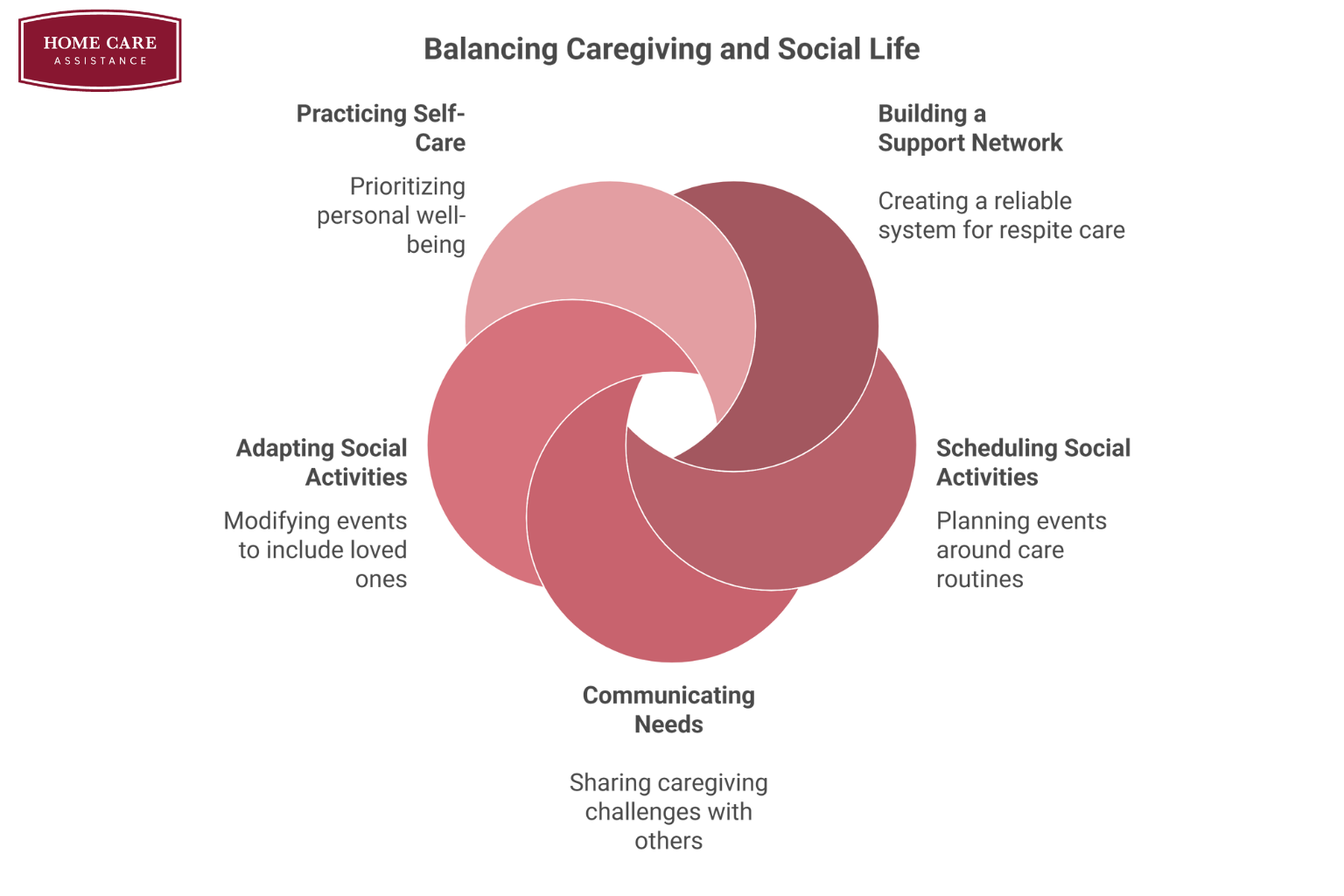Maintaining meaningful relationships while caring for a senior loved one with dementia requires careful planning and realistic expectations. Caregivers often have difficulty preserving their social connections, but finding balance remains essential for both personal wellbeing and effective caregiving.
Build a Reliable Support Network
Creating a dependable support system allows you to maintain social connections without compromising care quality. Start by identifying family members, friends, or neighbors who can provide occasional respite care during social activities.
Consider these networking strategies:
- Reach out to other family members to establish rotating care schedules.
- Connect with local caregiver support groups to meet others in similar situations.
- Ask trusted friends to spend time with your loved one while you attend social events.
- Research community volunteer programs that offer companion services.
- Explore adult day programs that provide structured activities and supervision.
Building these relationships takes time, but having multiple support options creates flexibility for spontaneous social opportunities. Many caregivers find that being transparent about their situation helps friends and family understand their needs and offer appropriate assistance.
A professional caregiver can be an invaluable member of your caregiving team. The type of home care service seniors need can vary. Some need assistance a few hours a day, while others require more extensive around-the-clock assistance. At Home Care Assistance, we tailor our care plans based on each senior’s individual care needs, and the plans can be adjusted at any time.
Schedule Social Activities around Care Routines
Strategic planning helps you participate in social events while maintaining the consistent routines that reduce anxiety in dementia patients. Work with your loved one’s established schedule to identify optimal times for social activities.
Effective scheduling approaches include:
- Plan social outings during your loved one’s afternoon rest periods.
- Schedule phone calls with friends during calm evening hours.
- Arrange brief coffee dates while your loved one attends day programs.
- Host small gatherings at home where you can maintain supervision.
- Join virtual social events that allow flexibility if care needs arise.
Shorter, more frequent social interactions often work better than lengthy commitments. A 30-minute coffee date may be more sustainable than a three-hour dinner party, allowing you to stay connected without overwhelming your caregiving responsibilities.
Communicate Your Needs to Friends and Family
Open communication about your caregiving role helps friends and family understand your limitations while maintaining supportive relationships. Many people want to help but don’t know what kind of support would be most valuable.
Share these important details with your social network:
- Explain your loved one’s condition and how it affects your availability.
- Suggest specific ways others can provide support, such as bringing meals or offering respite care.
- Let friends know that plans may need to change suddenly due to care emergencies.
- Ask for patience when you need to decline invitations or leave events early.
- Express appreciation for their understanding and continued friendship.
Setting realistic expectations prevents disappointment and helps you maintain stronger relationships over time. Friends who understand your situation are more likely to offer flexible support and maintain regular contact.
You may get a great deal of benefit from having a professional caregiver help with everyday tasks. Families looking for top-rated Anchorage in-home care providers can reach out to Home Care Assistance. From respite care to specialized Alzheimer’s, dementia, stroke, and Parkinson’s care, there are many ways we can make life easier for seniors and their loved ones.
Adapt Social Activities to Include Your Loved One
Including your loved one in appropriate social activities can help you maintain your relationships while providing stimulating experiences for him or her. Many social interactions can be modified to accommodate dementia-related needs.
Consider these inclusive approaches:
- Host simple dinner parties with familiar guests who understand the situation.
- Attend quiet community events like library programs or gentle exercise classes.
- Visit with friends in familiar environments where your loved one feels comfortable.
- Engage in activities your loved one previously enjoyed, such as gardening or crafts.
- Plan short outings to places with minimal sensory stimulation.
Pay attention to your loved one’s response to different social situations. Some dementia patients may enjoy gentle interaction with familiar people, while others may become anxious in group settings. Adjust your approach based on your loved one’s comfort level and current abilities.
Practice Self-Care without Guilt
Maintaining your own mental and physical health isn’t selfish—it’s necessary for sustainable caregiving. Regular self-care activities, including social connections, can help you prevent burnout and maintain your ability to provide high-quality care.
Prioritize these self-care strategies:
- Schedule regular check-ins with close friends, even if brief.
- Join online caregiver communities for emotional support and practical advice.
- Attend religious services or spiritual gatherings that provide comfort.
- Participate in hobbies or interests that bring you joy and relaxation.
- Accept help from others without feeling guilty about taking breaks.
Remember that taking time for yourself ultimately benefits your loved one by ensuring you remain physically and emotionally capable of providing care. High-quality caregiving requires caregivers who feel supported and connected to their broader communities.
Caring for seniors with dementia can be challenging for family caregivers. Luckily, there is dementia care Anchorage families can rely on. Professional dementia caregivers help seniors with dementia stay safe and comfortable at home by preventing wandering, providing cognitive stimulation, and assisting with household chores. Trust your loved one’s care to the professionals at Home Care Assistance. Reach out to one of our compassionate Care Managers today at (907) 770-0907.

